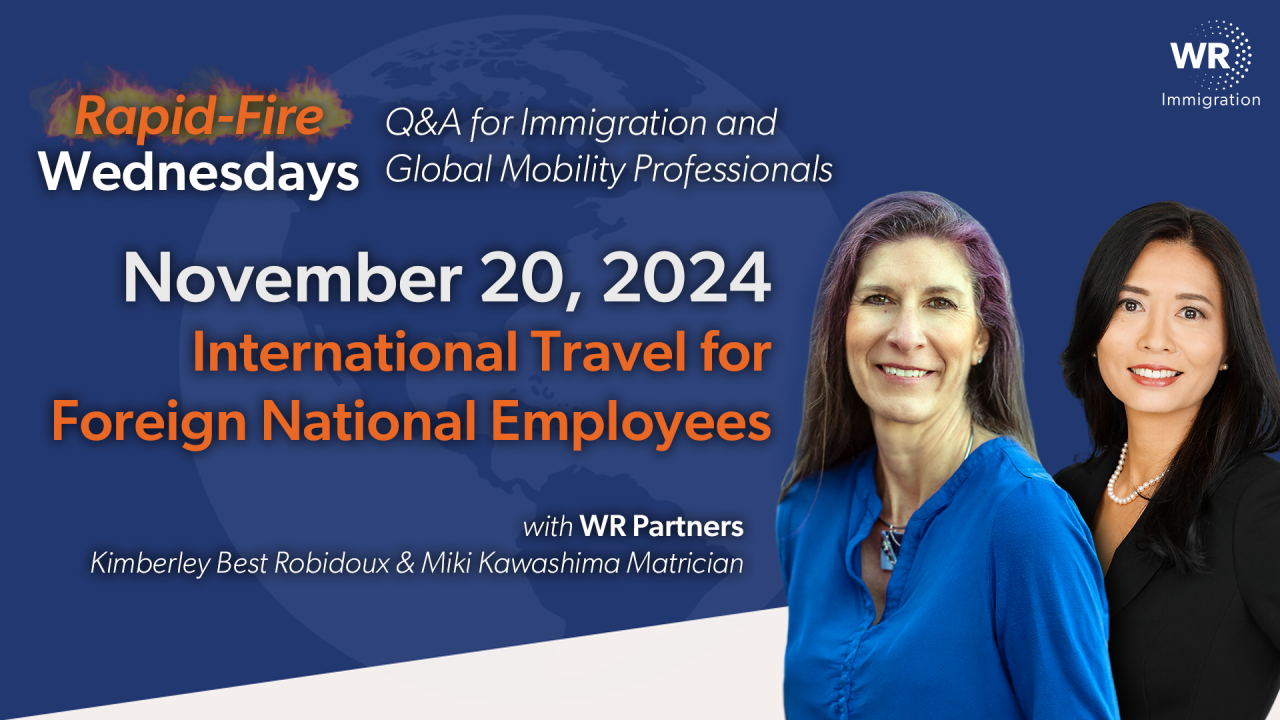The transcript version of our weekly Q&A livestream for corporate immigration professionals
By Kimberley (Best) Robidoux & Miki Kawashima Matrician
🔥Question: What are the main concerns for foreign nationals planning international travel during the holidays?
Response: While leaving the U.S. is straightforward, returning can pose challenges if foreign nationals aren’t prepared. Key concerns include ensuring they have the correct documentation, such as valid passports, visa stamps, and any necessary supporting paperwork. Preparing for potential consular interviews is also critical to avoid complications at the consular posts as well as at U.S. ports of entry.
🔥Question: What documents should foreign nationals prioritize when preparing to return to the U.S.?
Response: At a minimum, a passport valid for at least six months beyond the return date is essential. For those on temporary work visas, a valid visa stamp is generally required unless specific exceptions apply. In addition, individuals may need employment verification letters or other supporting evidence to submit with visa applications or to present at the port of entry. Planning weeks or even months in advance for consular processing is strongly recommended.
🔥Question: Do all foreign nationals need consular interviews to renew visa stamps?
Response: Not always. Some consular posts offer interview waivers, typically for individuals who have been issued a visa stamp previously. These cases involve submitting passports and documentation through a drop box by the foreign national provided that they are physically in the country in which they are applying for the visa stamp. However, interview waivers are subject to consular discretion, and individuals can still be called in for interviews or face delays due to administrative processing.
🔥Question: What should companies do if employees encounter administrative processing delays?
Response: Administrative processing is unpredictable and can extend visa application timelines by weeks or months. Organizations should have contingency plans in place, including remote work policies for employees delayed abroad. Proper planning ensures business continuity and minimizes disruption.
🔥Question: Are there unique rules for Canadian citizens or those entering the U.S. via Mexico (or Canada)?
Response: Canadian citizens, except those requiring E or K visa stamps, are generally visa-exempt. They must carry valid passports, employment documentation, and proof of relationships for dependents. For those entering from Mexico or Canada, the automatic visa revalidation rule allows short trips of under 30 days without requiring a new visa stamp, provided no third-country travel or visa application occurs during the trip. Please note that nationals from certain countries are not permitted to utilize this rule.
🔥Question: What common mistakes should foreign nationals avoid upon re-entry to the U.S.?
Response: Always verify the I-94 record for accuracy after admission. Errors in visa categories or expiration dates can jeopardize work authorization or other critical statuses. Promptly address discrepancies through the CBP deferred inspection office to avoid long-term complications.
🔥Question: How can foreign nationals mitigate risks given potential policy changes?
Response: Consult with immigration attorneys before travel, especially during transitions in U.S. administration. Planning to return before significant policy shifts, such as presidential inaugurations, can prevent unforeseen travel bans or disruptions.
Send us your questions via DM or using the below link!
HR Question Submission Form | Rapid-Fire Wednesdays
See you next week!


